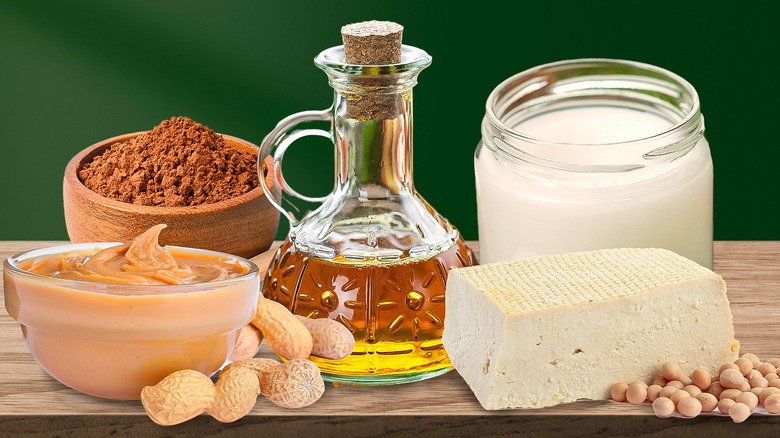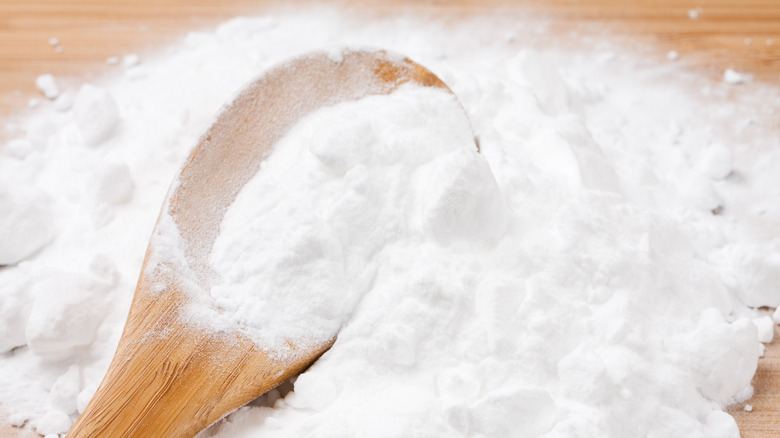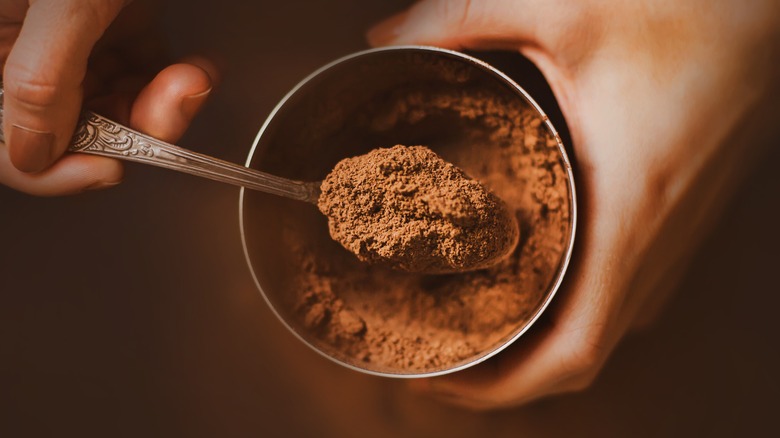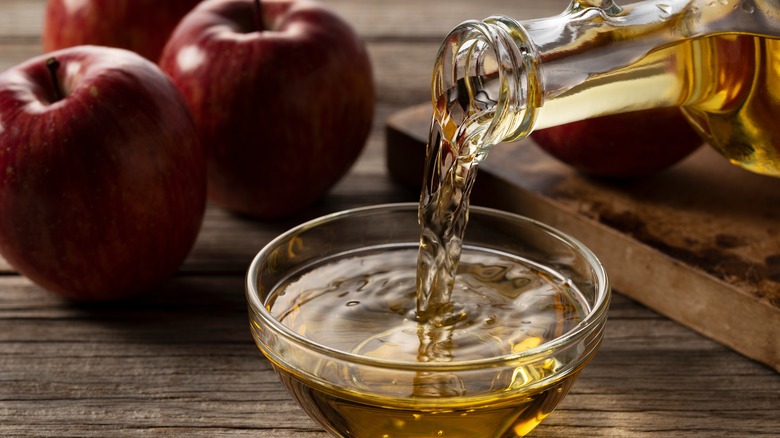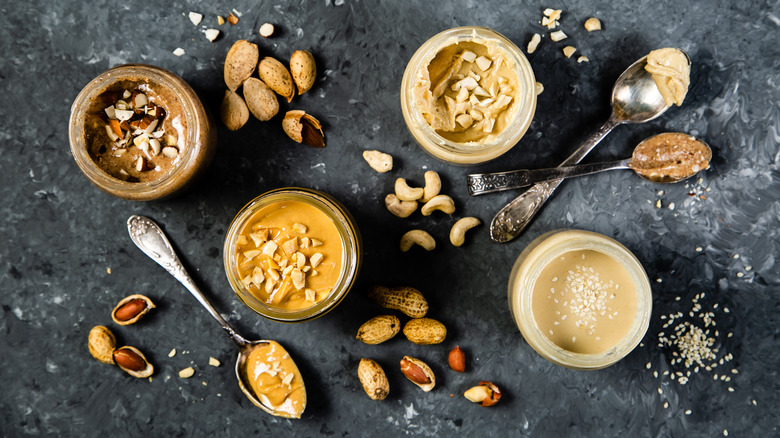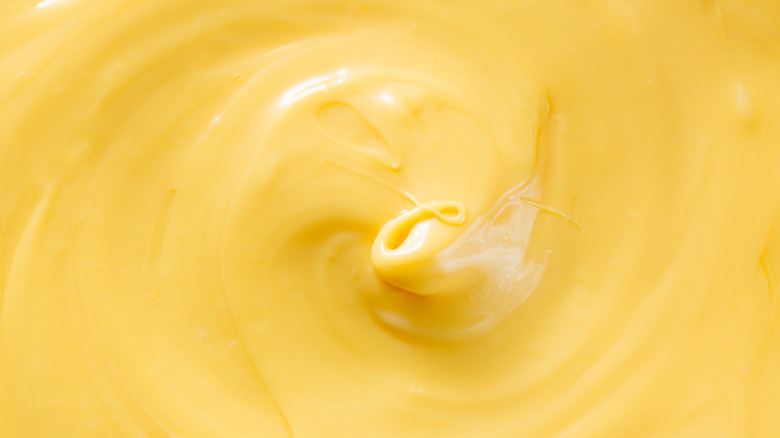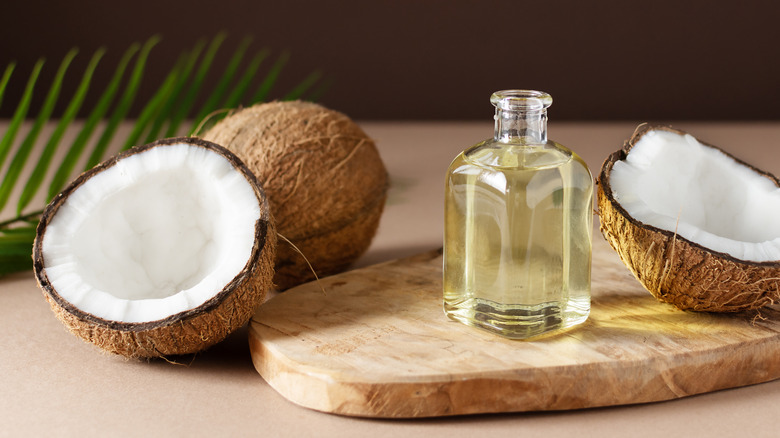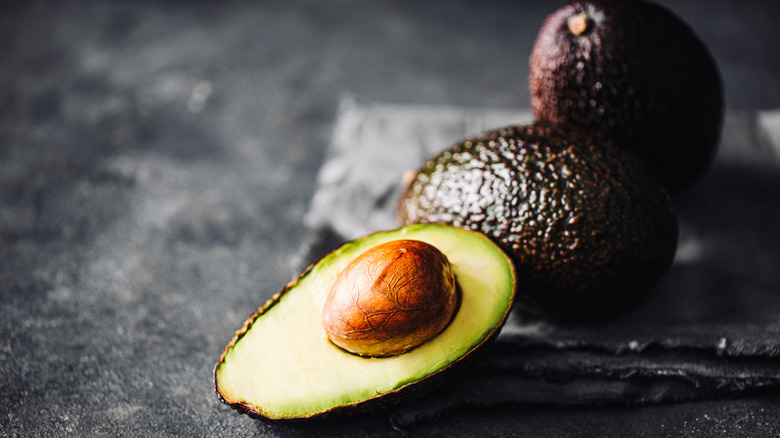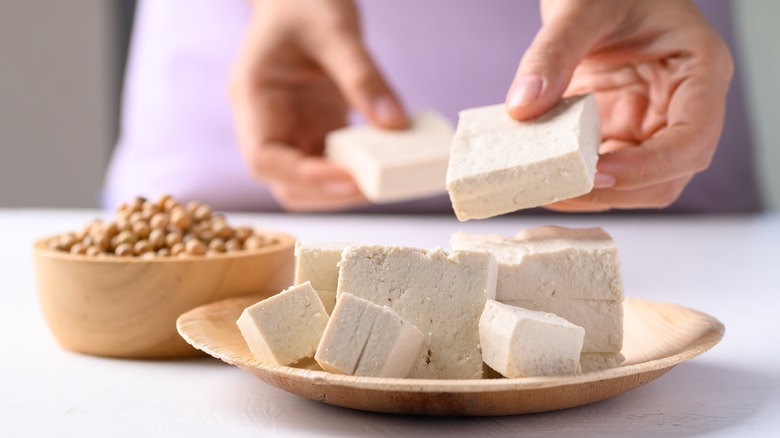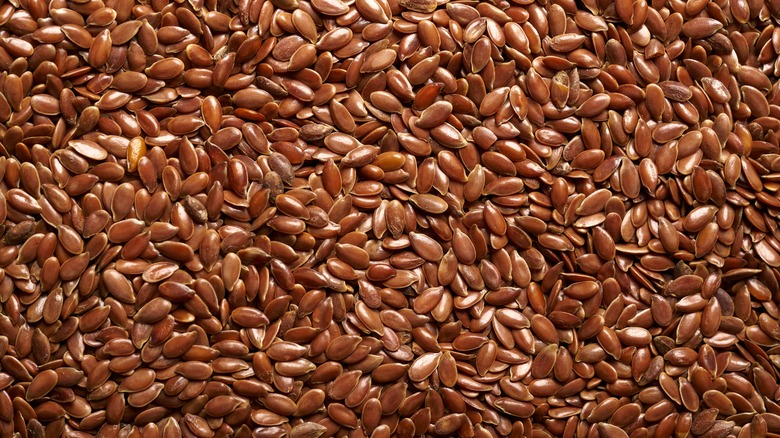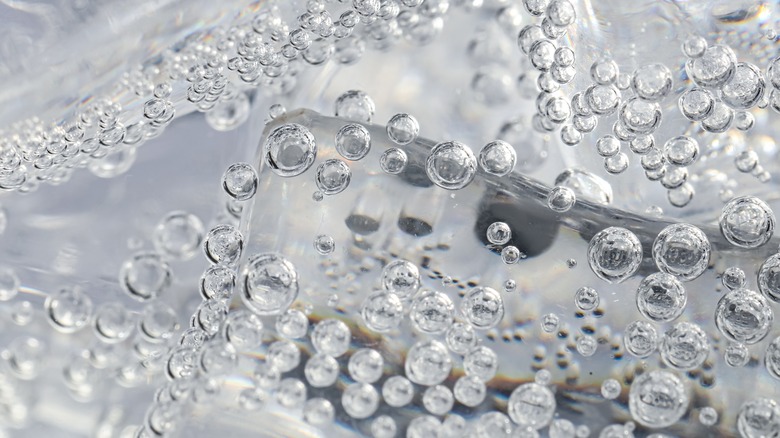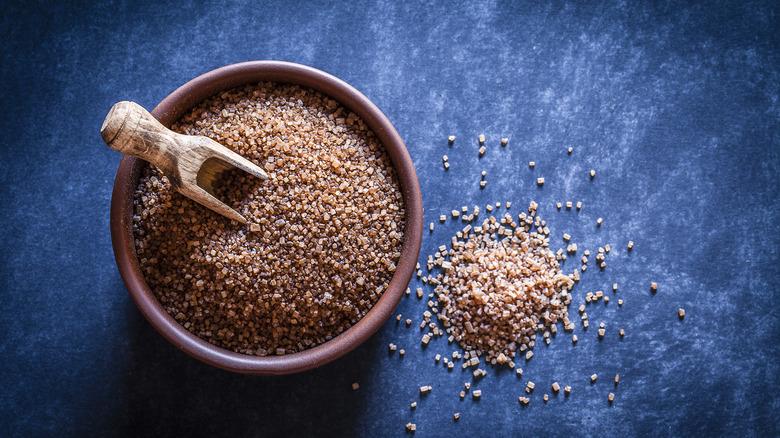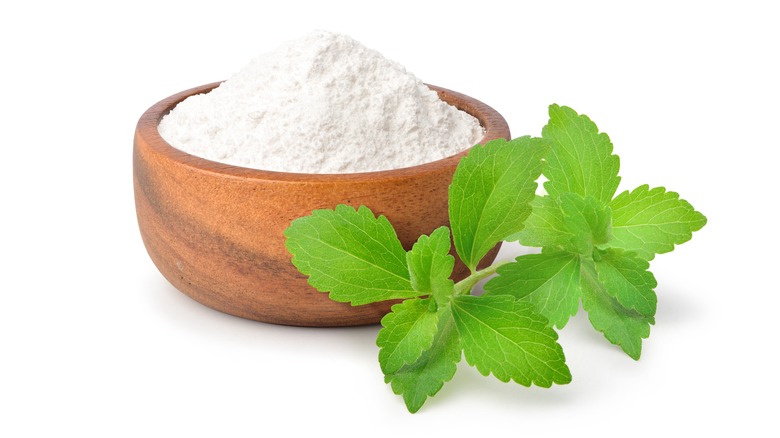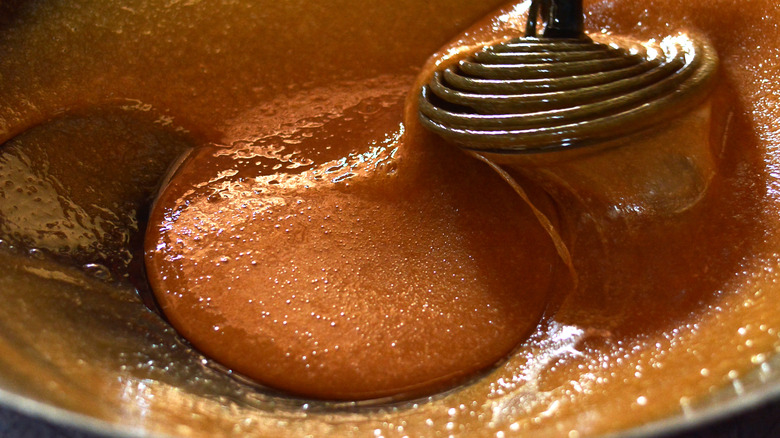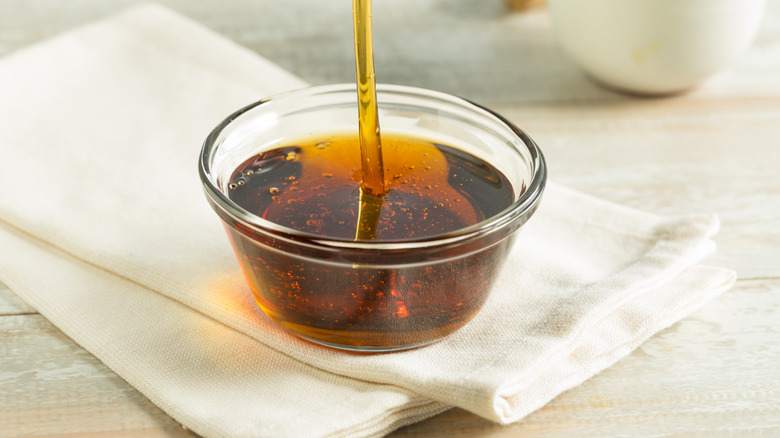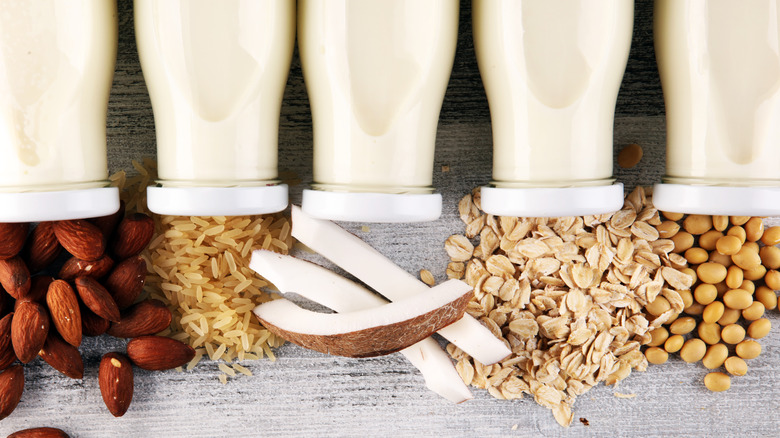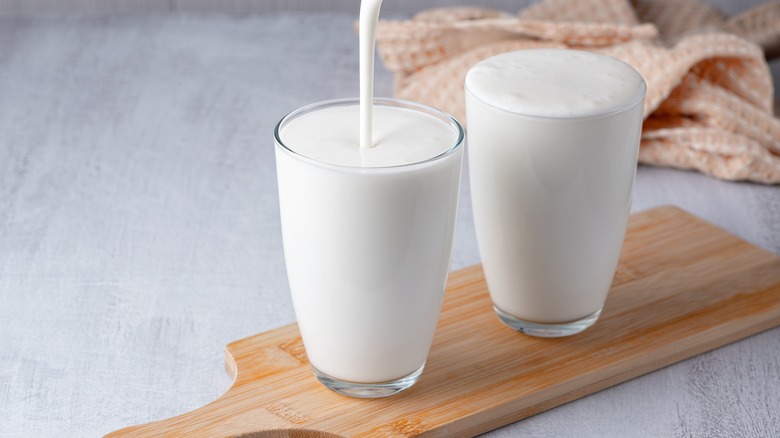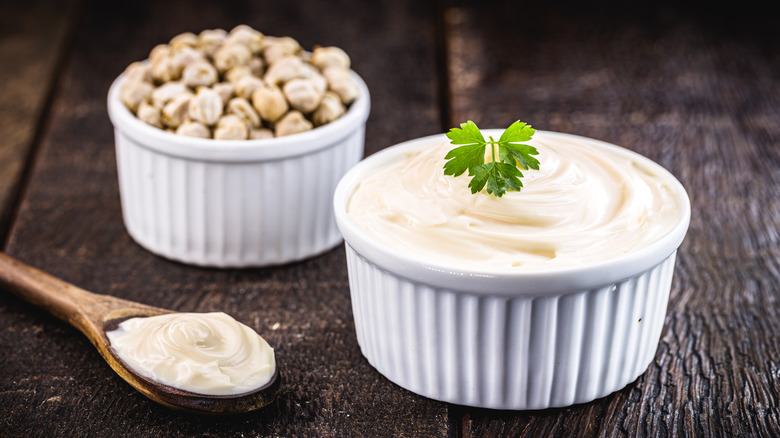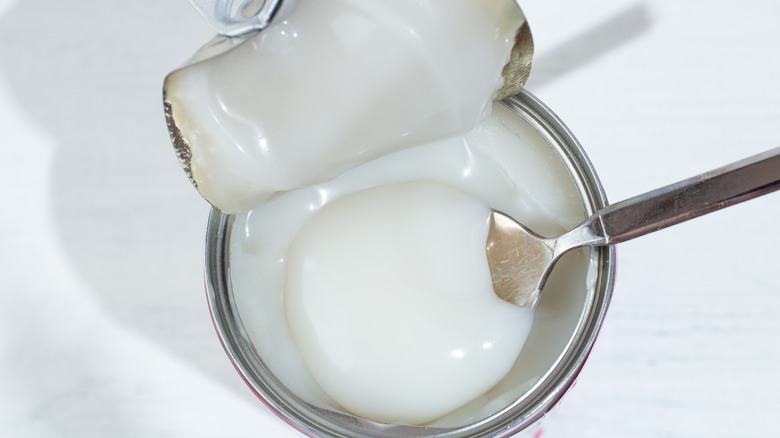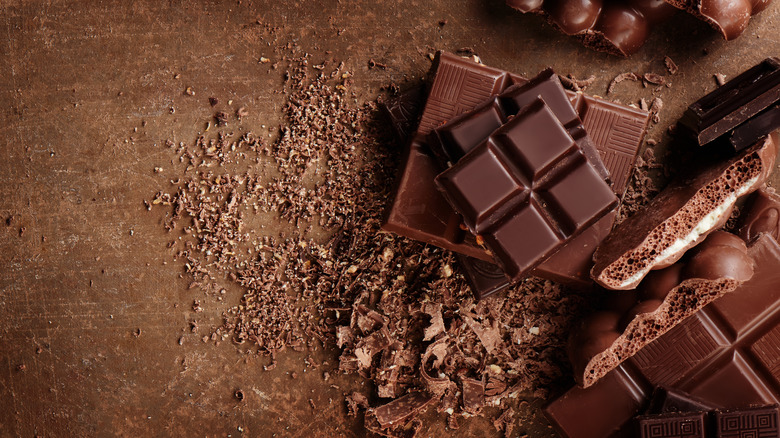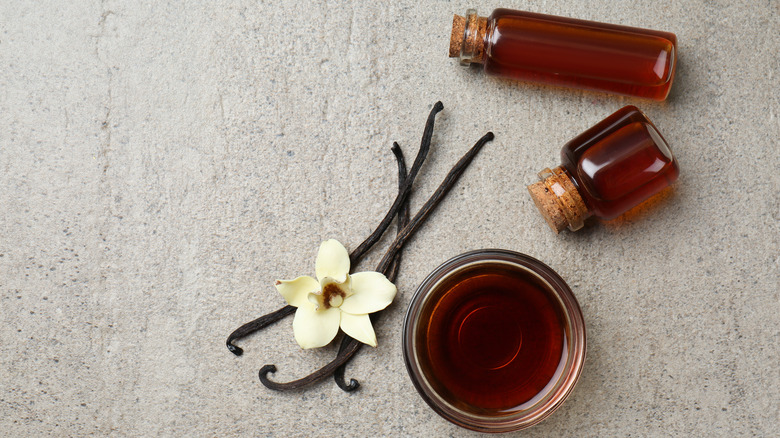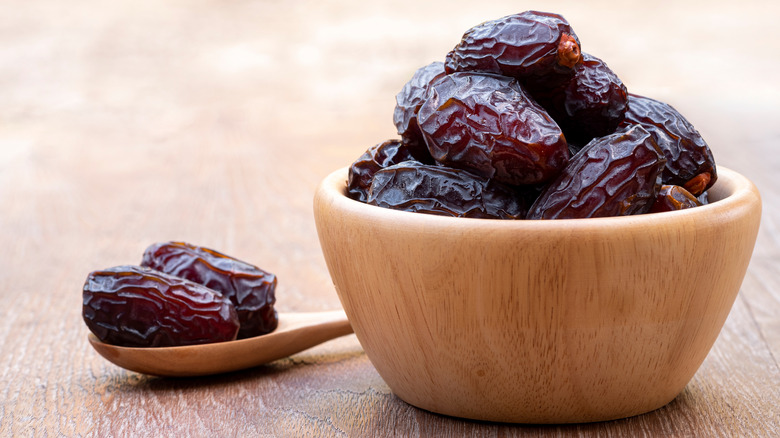22 Ingredients Every Vegan Baker Needs To Have
Baking is an art form that takes patience, precision, and passion. Even for recipes that only require a few ingredients, the slightest mismeasurement can turn a muffin into a cupcake, or be the difference between a pound cake and a sponge. Simply put, baking is as easy as it is unpredictable, and that's what makes it so tricky.
Unlike regular cooking, many of the primary ingredients we associate with baking aren't vegan-friendly. Furthermore, when you think about it, vegan baking is a fairly recent addition to the culinary lexicon. It was a completely foreign concept only a few decades ago and might've even garnered some laughs. To be fair, one could argue that dairy-free baked goods have only recently started tasting like respectable alternatives.
Life would be quite plain without pastries, that's why the trailblazers of this challenging style of baking definitely deserve their "flours." Whether you're looking to reduce your dairy intake, or hoping to simply rise to the occasion, below we've put together a list of ingredients every vegan baker needs.
Plain flour works for vegan and non-vegan baking
When it comes to flour, all-purpose truly means all-purpose. Flour doesn't include any non-vegan ingredients, which makes it completely transferable. For a short period, there was a rumor swirling over whether or not flour contains bone char, which is what gives white sugar its color. That turned out to be untrue. There are many flour varieties to choose from, and each is suitable for vegan consumption.
If you have a particular dietary restriction, fret not — flour is not only made of wheat. There's semolina, durum, spelt, and many more. You can even find gluten and gluten-free options. Simply put, there's a flour for all of your vegan baking needs.
Baking soda and powder are still necessary baking ingredients
Like flour, baking soda and baking powder are also vegan-friendly. They're both used in baking as leavening agents, helping to create a chemical reaction that helps dough rise. That's pretty much where the similarities end though, as baking soda requires an acidic agent to activate while baking powder doesn't. That's also a simple way to remember which one to use.
With vegan baking, as with regular baking, use soda for recipes that ask for buttermilk, vinegar, or yogurt. If it doesn't ask for acidity, you know powder is the way to go. Finally, for recipes like buttermilk biscuits, which need an extra boost of acidity, you can use both.
Add a chocolatey touch with cocoa powder
Cocoa powder is another vegan-friendly ingredient that provides a kick of acidity. For example, if you're using baking soda as a leavener, it's the perfect acidic pairing agent. It naturally helps balance the overall taste, neutralizing baking soda's soapy flavor.
Cocoa powder not only provides flavor, color, and acidity, but also has higher water absorption and adds bulk, which decreases the amount of flour you need. The only catch is choosing the right type of cocoa powder — some varieties have undergone what's called the Dutch process, which alkalinizes and reduces acidity. If you're looking for more zing though, make sure to use natural cocoa. Vegan or not, baking just wouldn't be the same without this chocolatey delight.
Use apple cider vinegar to help baked goods rise
For recipes that don't center around chocolate, an unlikely acidic alternative is apple cider vinegar. Although it's most often associated with savory foods like sauces and marinades, and also for pickling, apple cider vinegar is a dynamic ingredient that works great in baking. You'll commonly find it listed on vegan cookie dough recipes, as they add aeration usually provided by beaten eggs.
In addition to cookies, apple cider vinegar is also an unexpected ingredient people add to their pies. It prevents gluten from forming, which can cause the crust to be tough and chewy rather than tender, and also helps the browning process, giving your crust a delicious golden color.
Use nut butters as creamy alternatives to butter
One tasty way to cut down on saturated fats is by using nut butter instead of dairy. It provides a similar rise and has the added benefit of monounsaturated fats, which are the healthier kinda fats you want. Using nut butters lets you customize the flavor too — almond butter makes awesome blondies, while peanut butter blends perfectly with yellow chicken curry. There are endless combinations you can experiment with, and they're all vegan-friendly.
When cooking with nut butter, you can substitute it with butter at a 1-to-1 ratio. It's recommended that you mix equal parts nut butter and oil before using it in a recipe.
Vegan butters offer cream without the cow
Non-dairy butter has come a long way since Fabio found himself in a state of disbelief. Today's plant-based varieties do a commendable job of recreating the creaminess of the OG. That's great news for butter-lovin' bakers, as they can enjoy all of the flakey tenderness without the unhealthy saturated fats.
There are many types of vegan butter substitutes, including almond oil, coconut oil, macadamia, and oat milk, to name a few. To be honest, some brands nail that familiar butter taste better than others. You'll have to do a bit of exploration, but we're confident you'll find one that makes you feel all buttery inside. Well, what are you waiting for? It's time to try out some vegan butter.
Coconut oil is one of the best butter baking substitutes
With a little bit of experimentation, you'll discover that coconut oil is an awesome baking substitute for butter. It has a similar versatility that allows it to be used in a solid or liquid state. When using coconut oil, you'll have to test various ratios in order to achieve similar results as butter. Generally speaking, though, you can usually lean on a 1-to-1 ratio to get the job done.
Unless a recipe calls for liquid butter, your coconut oil should be more solid and creamier in consistency. If you enjoy the taste of coconut, unrefined oil will give you the same high-fat content with flavor to boot, and every baker loves that.
Avocados are a healthy-fat alternative to butter
Avocados are a slightly more surprising alternative to using butter in baking. They're creamy, complementary with other flavors, and according to HSPH, are loaded with health-boosting monounsaturated fats. As mentioned, those are the heart-improving, diabetes-regulating, anti-inflammatory kinds of fats.
Avocado's butter-like consistency goes great with everything from brownies to pound cake. We recommend a 1-to-1 ratio when replacing butter with avocado. One distinction to keep in mind is that avocado doesn't melt like butter. To achieve more moisture, you can use half and half of each, or add slightly more water, oil, buttermilk, or whatever liquid your recipe instructs for. Check out this Filipino dessert and learn some avocado's and avocadon'ts.
Tofu can be used as a protein-rich egg replacer
It's easy to imagine egg-free baking as dull and undesirable, but thankfully, that culinary myth has long been debunked. A great vegan substitute for the structure, emulsification, and moisture that eggs provide is tofu. Its mild-flavored profile makes it perfect for blending with flavors, and although it doesn't pack nearly the amount as eggs, it's still a great source for protein.
Silken and firm tofu both work in baking, yet the firm variety is best as an egg replacement. One noticeable difference you'll find when using tofu is that baked goods don't brown as much. Besides that, whether your sweet tooth craves cookies, or if a quiche is more your niche, you're in good hands with tofu.
Flax seeds are fatty acid-rich egg substitutes
The search for the best egg replacer in vegan baking didn't end with mere tofu, since milled flax seed is also another proven substitute. Along with providing texture and increased water absorption, flax seeds are super nutritious for you. According to AmeriFlax, they contain essential vitamins and minerals, Omega-3 fatty acids, and loads of fiber. And what's more, baking doesn't lower the nutritional content at all.
When using this protein alternative, we recommend 1 tablespoon (15 milliliters) of milled flax and 4 tablespoons (45 milliliters) of water for each egg. Although the texture will differ, it's definitely one of the best vegan baking hacks we recommend giving a try.
Sparkling water is an unlikely leavening agent
With a bit of eggs-ploration, you'll find that there are many leavening substitutes for vegan baking. One bubbly ingredient that might surprise you is sparkling water. Combined with another egg substitute, it can re-enact the role eggs play in baking. When carbonated water is introduced to your mixture, it creates gas that helps it rise.
Sparkling water also adds increased moisture, ensuring you don't have an overly dry experience. With it, you don't have to worry about leavening it up to faith, as it's sure to get the job done. Pour a bit into the mix next time you're scratching a pastry off your baking bucket list.
Certified organic sugar offers animal-free sweetness
Were you today years old when you found out that sugar isn't always vegan? More specifically, raw sugar itself is vegan, but a de-coloration process makes it non-vegan. Cattle-sourced bone char is used to give brown raw sugar a white color. Way back in the day when vessels roamed the open seas, sugar was a hot commodity.
One jaw-droppingly evil fact about that time, shared in Patterns of World History, is that charred animal bones were supplemented by bones from deceased slaves. Thankfully, that's no longer the case. Historical rabbit holes aside, if you're looking for animal-free sugar, we suggest purchasing certified organic sugar that's specifically labeled vegan.
Stevia and beets provide all-natural sugar-free sweetness
Outside of sugar, there are several other natural sweeteners that work great for baking. Three of the more popular alternatives are stevia, coconut, and beet sugar. Stevia is at least 30 times sweeter than sugar, yet can sometimes provide up to 450 times the sweetness. Unlike sugar, when cooking with stevia, you don't have to worry about spikes in blood glucose levels.
Carrying a similar color tone, coconut sugar is a great alternative for brown. Just make sure to blend it before use. Beet sugar is also a satisfying saccharine substitute. In fact, the majority of sugar produced in America comes from beets. The most important thing is to make sure that you account for the additional sweetness when using natural sugar in recipes.
Coconut nectar is a lesser-known honey replacer
The debate between sugar and honey is a never-ending one. They're both essential baking ingredients, yet neither is vegan. Like sugar, there are a plethora of substitutes for honey. One lesser-known source of sweet deliciousness is coconut nectar. Caramel-colored and all-natural, coconut nectar is extracted from tree sap using minimal processing. That means it's not only vegan-friendly, unlike honey, it retains much of its original nutrients.
Coconut nectar is also an excellent maple syrup alternative. Although maple syrup also undergoes minimal processing, it carries far more calories than coconut nectar. That's why compared to other sweeteners, coconut nectar is actually one of the healthiest options around.
Agave syrup has the look, taste, and feel of honey
Agave syrup is also among the ranks of honey alternatives. Similar in consistency and sugar content, it's one of the best honey substitutes out there. When it comes to sweetness, agave is the clear victor. You can easily make baked goods explosively sweet if you use too much.
Aside from being super sweet, one downside to agave is its glucose levels, which exceed that of honey (but does make it healthier than table sugar). It's composed of an impressive range of healthy phytonutrients, which provide anti-oxidizing qualities, and it also happens to be free of many allergens commonly found in foods. It's definitely a staple ingredient vegan cooks should have.
Choose from a wide selection of dairy-free milk substitutes
As with alternative sweeteners, there's a wide selection of dairy-free milk substitutes to choose from. From oat and almond to soy, rice, flaxseed, and everything in between, it really depends on your personal preference and what the recipe requires. Some varieties, like coconut and macadamia, carry a more pronounced taste, while others like soy and rice can blend seamlessly into the mix.
Different milks also provide varying nutrients as well. That means that the absolute best milk substitute is totally dependent on what consistency, taste, and texture you're going for. As with any replacer, make sure to research the best conversion so you'll get the results you want in the end.
Combine vinegar and plant-based milk for dairy-free buttermilk
Much to the benefit of vegan bakers, there's even a dairy-free way to make buttermilk. Used to help baked goods rise, buttermilk adds tang and acidity, which helps balance out the overall sweetness. Buttermilk also breaks down gluten, resulting in a softer, more desirable texture.
The best part about dairy-free buttermilk is that it only requires two ingredients. There are several quick and easy combinations you can use to ensure your pastry carries the right touch of sourness. Some options include vinegar and milk, lemon juice and milk, and other surprising ones like yogurt and kefir. Check out these six substitutes for buttermilk next time you crave a delicious stack of pancakes.
Aquafaba is the secret ingredient for creamy frosting
Another surprising ingredient used in vegan baking is called aquafaba, or chickpea liquid. While the idea of legume juice doesn't sound the most appealing, it's actually a pretty powerful starch. In baking it has a variety of uses. You can whip up a stable meringue, a velvety mousse, and even creamy frosting. It's the chemical makeup of the liquid that makes it a great foaming agent for giving baked goods structure.
Aquafaba is also mild-flavored and adaptable, making it a popular go-to for bakers. In addition to its structure-providing qualities, whipped aquafaba can be used as an egg replacer in baking recipes, adding air and depth.
Canned coconut cream is the heavy cream replacer you need
Heavy cream is another essential ingredient used in baking for thickening and enriching a wide range of recipes. Not to be confused with whipping cream, which has a lighter consistency and is lower in fat, heavy cream is firmer, allowing it to retain shape longer.
Fortunately, there's a vegan alternative for this necessary additive: coconut cream. Along with being the perfect dairy-free go-to, according to Healthline, it's super flavorful, low in carbs, and filled with potassium. It's also easy to make coconut cream — all you need to do is refrigerate coconut milk for a few hours until the cream separates from the liquid and creates a thick top layer.
Dark chocolate is dairy-free and delicious
There are few ingredients that are as delicious and decadent as chocolate. A winning go-to in baking, you'll find no shortage of recipes to remedy your coco-cravings. Although there are many varieties of this special superfood, milk chocolate is generally preferred over dark because it's creamy and sweeter. In fact, a YouGov poll found that nearly half of Americans consider milk their favorite, while only a third say dark.
That said, there are three main types of dark chocolate: unsweetened, bittersweet or dark, and semisweet. When cooking with chocolate, knowing which is best for your recipe will certainly save you from making big mistakes. We definitely recommend exploring the unique tastes and textures of different chocolate types.
Boost flavor with a few drops of vanilla extract
If you're looking for a flavorful boost to your baking, look no further than vanilla extract. Aromatic and sweet, it's an all-purpose ingredient that makes any baking recipe more delicious.
There are a few things to take into consideration when baking with vanilla extract, namely the difference between pure and imitation. Pure is more expensive, yet vastly superior in taste and aroma. Vanilla's synthetic sibling is actually vanilla-free. It replicates vanillin, which is the compound that's responsible for everything we love about vanilla. Naturally, imitation is cheap and most commonly available at local grocery stores. When it comes to the one we recommend, we think you know the answer to that.
Add dates for a burst of sweetness
Soft, chewy, and naturally sweet, dates are surefire subs for sugar and syrup. Although there are at least 15 types of dates, Noor Deglet and Medjools are the most common and easy to find in the States. The former tends to be smaller and more bitter while the latter is large and sweet.
Medjool dates are unique for their nutritional value. Per WebMD, Medjool dates aren't only sugar-rich, but also an excellent source of selenium, magnesium, calcium, potassium, and copper, all of which are essential minerals. From chewy date-nut bread to the tastiest, prettiest stuffed dates, we absolutely suggest sweetening up your next recipe with them.
